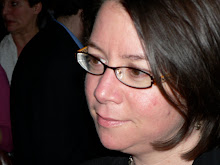I am of the opinion that there are a lot of bad words a kid needs to learn before middle school. Not in order to
use them, although I think that in the right time and place that can be fine. The main reason is that to be uninformed is to be vulnerable. If other kids say, "Hey come with us, we have some pot," or "Everyone who comes to this party gets a blow job," and you don't know what "pot" or "blow job" are, you are helpless. It is nice to fantasize that no one will ever say these things to our sweet innocent children, but this is a fantasy. It is also tempting to think that we parents are protecting our children's innocence by keeping these words from them, but I think this is not true either. Our family discussion of the
Vagina Chant has not caused any increased use of the term (far from it). And also I think their innocence runs deeper than any vocabulary, a true absence of the kind of cynicism and rebelliousness that bad words signify. Though possibly this is another fantasy.
We are embarking on a year of Bad Words Education in our household because Jordan starts middle school in a year, and is already hanging out with 13 year olds at boychoir. Life presents many teachable moments in this area. For example, Aaron's seven-year-old friend told Jordan yesterday that Aaron was "pissed off" about something. (This was correct, but crudely put.) Jordan did not know what "pissed off" meant, but he could tell it was a bad word, and he was startled that this kid would say it. It turns out that Jordan and Aaron didn't know what "piss" meant, either. So I told them
piss is a rude word for
pee, kind of the same thing as
crap being a rude word for
poop. I said how some people might say they were going to "take a piss" and that means go pee. I said how people who do this are probably looking to sound kind of tough and shocking on purpose, to get your attention, but it really just means pee. I said that for some reason that I don't know, "pissed off" means angry. We had a laugh imagining what the relationship might possibly be: do people have to pee when they get really mad? Do they get so mad they want to pee on someone? A mystery. (Bad Words Education will have many mysteries.) After this discussion my kids were
more disturbed by the phrase, rather than becoming inured to it, and more disturbed that their friend used it.
Rachel: I think bad words come in three categories: swearwords, sex words, and drug words. I will tell you about these words a little at a time, not all on one day. You don't want to hear them all at once.
Jordan: No, that would make me sick.
Rachel: Aaron, you do not have to listen to these words if you don't want to. You have a long way to go until middle school, so you could wait.
Aaron: I want to hear this too. My friends say bad words sometimes, like, you know, that one that we talked about.
Jordan: One guy in boychoir says - Mommy can I say it just once to tell you what it is?
Rachel: Yes, definitely. You can always say any word one time to tell me what the word is. You will never get in trouble for that.
Jordan: Okay. One guy in boychoir says.... eff you. I'm not going to say the word after all.
Rachel: Okay, let's talk about that one. I'm going to say it, so get ready: The saying is, fuck you.
[Jordan and Aaron gasp and giggle.]
Rachel: We have talked about this word before, do you remember? This saying means something like, "Somebody should stick their penis in you whether you want them to or not."
[The children are appalled, a tumult of small shrieks, disgusted and giggling and writhing in their seats.]
Jordan: I don't even know why anyone would do that!
[See what I mean about their deep innocence?]
Rachel: It's meant as a very angry thing to say. But maybe the guy in boychoir was not very angry. Sometimes people say it just very casually, too, not only "fuck you" but "fucking" [the children wince]. Like someone might say, "Could you get me some more fucking water."
Jordan [laughing hysterically]: That is so weird! That doesn't even make any sense!
Rachel: You're right, it makes no sense, but the idea is that it sounds kind of angry and exciting. People usually say it when they're frustrated. The water is not a very good example. A better example would be, remember before dinner I was having such a hard time stringing those beads? I might have said, "I cannot get this fucking bead onto this fucking string!"
[The children collapse in gales of helpless laughter.]
Jordan: What does that even mean! Stick your penis in a string? Stick a string in your penis?
Rachel: I know, it doesn't make any sense.
After we had recovered from that, I invited Jordan to choose a bad words category. He said "I definitely do not want to hear any sex words, and we already did some swear words, so you can tell me some drug words." I decided to start with marijuana, which is all over the newspapers these days in our state. I told them all the nicknames I could think of for marijuana, for getting high, and some basic paraphernalia. I am sure I did not cover everything, and will never cover everything in this lively, ever-changing linguistic area. But I think it helps. If nothing else, it establishes bad words as appropriate subjects for family discussion.

